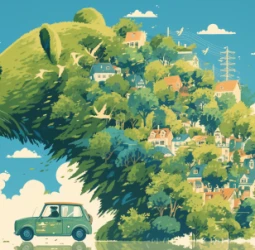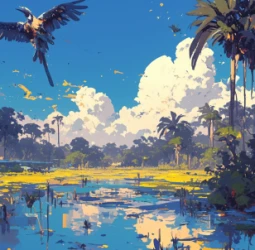Marine Conservation in Brazil: Preserving the Rich Ecosystems of Brazilian Coastal Areas
Brazil is known for its diverse and abundant natural resources, with its vast and beautiful coastline being a prime example. The country's coastal areas are home to a rich and vibrant marine ecosystem that supports a wide range of marine species and provides livelihoods for coastal communities. However, like many other coastal regions around the world, Brazil's marine environment is facing numerous threats, such as overfishing, pollution, and habitat destruction. To address these issues and preserve the valuable marine resources, the Brazilian government and various non-governmental organizations (NGOs) have been working tirelessly to implement marine conservation measures.
Marine conservation refers to the protection and sustainable management of marine ecosystems and resources to ensure their long-term viability and health. As a megadiverse country, Brazil harbors 9% of the world's marine species, making it one of the most biodiverse regions in the world. The country's extensive coastal areas span over 8,000 kilometers, covering a range of ecosystems, from coral reefs and mangroves to estuaries and sandy beaches. These habitats support a variety of marine life, including fish, dolphins, sea turtles, and several endangered species.
One of the main threats to Brazil's marine environment is overfishing. In the past, Brazil's fishing industry was largely unregulated, leading to the depletion of fish populations and disruption of the marine food chain. In response, the Brazilian government introduced the National Plan of Action for the Conservation and Management of Sharks and Rays in 2018, which aims to protect vulnerable shark and ray species and promote sustainable fishing practices. Additionally, NGOs, such as the Marine Megafauna Foundation, are working with local fishermen to develop sustainable fishing techniques and raise awareness about the importance of conservation.
Pollution is another critical issue facing Brazil's coastal areas. The country's booming industrial and agricultural sectors have led to the discharge of harmful substances into the marine environment, causing significant ecological damage. The cities of Rio de Janeiro and São Paulo alone produce over 3,500 tons of waste that enters the ocean every day. To combat this, the Brazilian government has implemented strict laws and regulations to control waste disposal and promote recycling. NGOs are also actively involved in organizing beach cleanups and educating communities about the impact of plastic pollution on marine life.
Protecting and preserving marine habitats is also crucial in maintaining the overall health of the marine ecosystem. Brazil's coral reefs are home to an impressive variety of fish, invertebrates, and other marine organisms. These delicate ecosystems are under threat from human activities such as destructive fishing practices and climate change. As a response, the government has established several marine protected areas, including the Abrolhos Marine National Park, to safeguard these vital habitats.
Furthermore, the Brazilian government has also implemented strict regulations to control the development of coastal areas. The construction of ports, housing developments, and dredging have been restricted in sensitive marine habitats to prevent damage to the ecosystem. This measure ensures the natural processes of sedimentation and erosion are not disrupted, thus preserving the beaches and coastal vegetation.
In addition to governmental efforts, many NGOs in Brazil are actively involved in marine conservation. The Chico Mendes Institute for Biodiversity Conservation (ICMBio) works to protect endangered marine species, such as the humpback whale, through research, monitoring, and conservation projects. Greenpeace Brazil focuses on advocating for the protection of marine areas and promoting sustainable practices. The efforts of these organizations have led to significant progress in the conservation of Brazil's marine environment.
In conclusion, Brazil's marine conservation efforts have made considerable strides in preserving the diverse and valuable marine ecosystems along its coasts. However, there is still much work to be done to address the remaining threats and ensure the long-term sustainability of these resources. Through continued collaboration between the government, NGOs, local communities, and international partners, Brazil can continue to safeguard its marine environments for future generations to come.
Brazil is known for its diverse and abundant natural resources, with its vast and beautiful coastline being a prime example. The country's coastal areas are home to a rich and vibrant marine ecosystem that supports a wide range of marine species and provides livelihoods for coastal communities. However, like many other coastal regions around the world, Brazil's marine environment is facing numerous threats, such as overfishing, pollution, and habitat destruction. To address these issues and preserve the valuable marine resources, the Brazilian government and various non-governmental organizations (NGOs) have been working tirelessly to implement marine conservation measures.
Marine conservation refers to the protection and sustainable management of marine ecosystems and resources to ensure their long-term viability and health. As a megadiverse country, Brazil harbors 9% of the world's marine species, making it one of the most biodiverse regions in the world. The country's extensive coastal areas span over 8,000 kilometers, covering a range of ecosystems, from coral reefs and mangroves to estuaries and sandy beaches. These habitats support a variety of marine life, including fish, dolphins, sea turtles, and several endangered species.
One of the main threats to Brazil's marine environment is overfishing. In the past, Brazil's fishing industry was largely unregulated, leading to the depletion of fish populations and disruption of the marine food chain. In response, the Brazilian government introduced the National Plan of Action for the Conservation and Management of Sharks and Rays in 2018, which aims to protect vulnerable shark and ray species and promote sustainable fishing practices. Additionally, NGOs, such as the Marine Megafauna Foundation, are working with local fishermen to develop sustainable fishing techniques and raise awareness about the importance of conservation.
Pollution is another critical issue facing Brazil's coastal areas. The country's booming industrial and agricultural sectors have led to the discharge of harmful substances into the marine environment, causing significant ecological damage. The cities of Rio de Janeiro and São Paulo alone produce over 3,500 tons of waste that enters the ocean every day. To combat this, the Brazilian government has implemented strict laws and regulations to control waste disposal and promote recycling. NGOs are also actively involved in organizing beach cleanups and educating communities about the impact of plastic pollution on marine life.
Protecting and preserving marine habitats is also crucial in maintaining the overall health of the marine ecosystem. Brazil's coral reefs are home to an impressive variety of fish, invertebrates, and other marine organisms. These delicate ecosystems are under threat from human activities such as destructive fishing practices and climate change. As a response, the government has established several marine protected areas, including the Abrolhos Marine National Park, to safeguard these vital habitats.
Furthermore, the Brazilian government has also implemented strict regulations to control the development of coastal areas. The construction of ports, housing developments, and dredging have been restricted in sensitive marine habitats to prevent damage to the ecosystem. This measure ensures the natural processes of sedimentation and erosion are not disrupted, thus preserving the beaches and coastal vegetation.
In addition to governmental efforts, many NGOs in Brazil are actively involved in marine conservation. The Chico Mendes Institute for Biodiversity Conservation (ICMBio) works to protect endangered marine species, such as the humpback whale, through research, monitoring, and conservation projects. Greenpeace Brazil focuses on advocating for the protection of marine areas and promoting sustainable practices. The efforts of these organizations have led to significant progress in the conservation of Brazil's marine environment.
In conclusion, Brazil's marine conservation efforts have made considerable strides in preserving the diverse and valuable marine ecosystems along its coasts. However, there is still much work to be done to address the remaining threats and ensure the long-term sustainability of these resources. Through continued collaboration between the government, NGOs, local communities, and international partners, Brazil can continue to safeguard its marine environments for future generations to come.



 dev1
dev1















